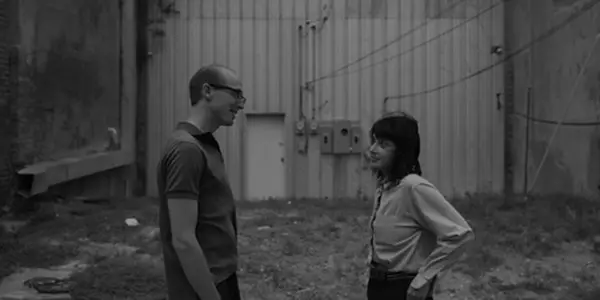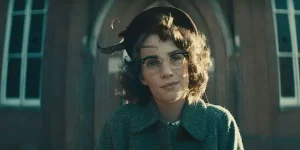
Filmmaker Pete Ohs’ follow-up to his horror satire Jethica is another delightfully lo-fi genre film, one that takes place in an alternative timeline—“the past of a different future,” according to the film’s narrator—where having a job is illegal and humans spend their days perfecting hobbies instead of producing goods. Sounds great, right? But what do you do in such a world if you’re someone who legitimately loves to work? That is the unusual conundrum faced by the characters at the heart of Love and Work, which spins science-fiction and romantic comedy together into a strange brew that goes down sweet and leaves you wanting more.
The Meaning of Life
Co-written by Ohs (who also produced, shot, and edited the film) with lead actors and previous collaborators Stephanie Hunt (Youngstown) and Will Madden (Jethica), Love and Work opens with Hunt’s Diane entering what appears to be an abandoned warehouse in search of something explicitly illicit but enticing: a job. In a world where too many things have been made, there is no need to work and make more; all time is now free time, as per the law.
source: Slamdance Film Festival
After a brief meeting with the boss, Hank (Frank Mosley) which sounds more like a conversation about a drug deal or an illegal abortion than a typical job interview, Diane is put to work making shoes with a small cohort of colleagues that includes Madden’s earnest, awkward Bob Fox. But when the operation is busted by volunteer “reminders” (obviously, they cannot be considered workers) who seek out and stop illegal jobs, Diane and Fox find themselves out of work yet again.
Together Diane and Fox roam the eerily quiet, unusually empty town in which they live, questioning random people in the park if they know of any opportunities by using code terms related to the weather. They’re hustlers, trawling not for partners but for ways of being productive. When they spot someone gleefully swinging and having an obvious good time, all they can think of is how empty and pointless it all seems. For them, only work sparks joy—until they start falling for each other.
Time Enough at Last
Shot in simple black and white on bare-bones sets with lots of exposed brick and little in the way of furniture or props, the world of Love and Work has an almost post-apocalyptic feel—except, unlike your typical dystopian thriller, the worst thing that can happen to our heroes if they’re caught by the powers that be is they might be forced to try a hobby. Still, the dry, deadpan humor of the film’s dialogue (not to mention the way the delightful cast delivers it) manages to sell the notion that such a punishment is the worst thing in the world—at least, it is in this one.
source: Slamdance Film Festival
The film’s cast of characters is small and the town they occupy seems strangely quiet and empty; I’m not sure what everyone is doing with their time now that they don’t have to work, but it seems very few of them are doing it outside, which only adds to the feeling that this world exists somewhere strangely outside of time. And while one might find it hard to imagine wanting to do things like make shoes and assemble cardboard boxes so badly that you’d risk breaking the law to do it, the message buried at the heart of Love and Work—that we all need some kind of purpose in our lives to be truly happy—does ring true.
What Diane, Fox, and others of their ilk don’t quite understand is that meaningless, wasteful work that is done merely to feel like one is doing something isn’t the answer either. However, love might be, something that Fox figures out far earlier than Diane does. Their burgeoning relationship is strange but warm, much like the folksy original songs by Charles Watson that comprise the film’s soundtrack and help establish the film’s unusual tone—think The Twilight Zone by way of Fallen Leaves.
Conclusion
With his fourth feature film, Ohs has proven himself a master of creating unique screen stories with remarkably little on-screen frills—not to mention, refreshing short running times. And while Love and Work doesn’t have as thoroughly satisfying an ending as Jethica did, it’s still a thoroughly enjoyable and undeniably creative movie, the kind that Slamdance was designed to celebrate.
Does content like this matter to you?
Become a Member and support film journalism. Unlock access to all of Film Inquiry`s great articles. Join a community of like-minded readers who are passionate about cinema – get access to our private members Network, give back to independent filmmakers, and more.









